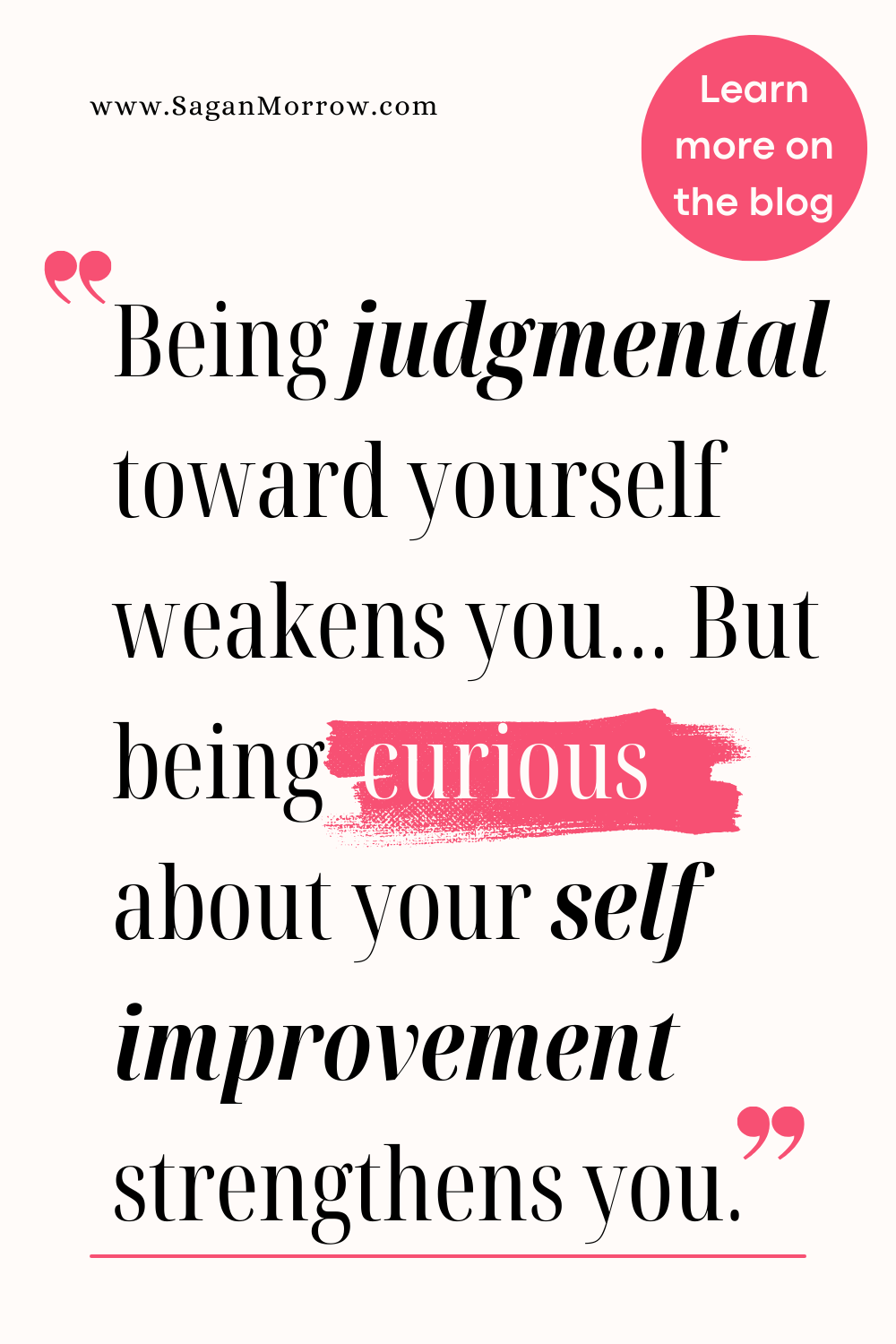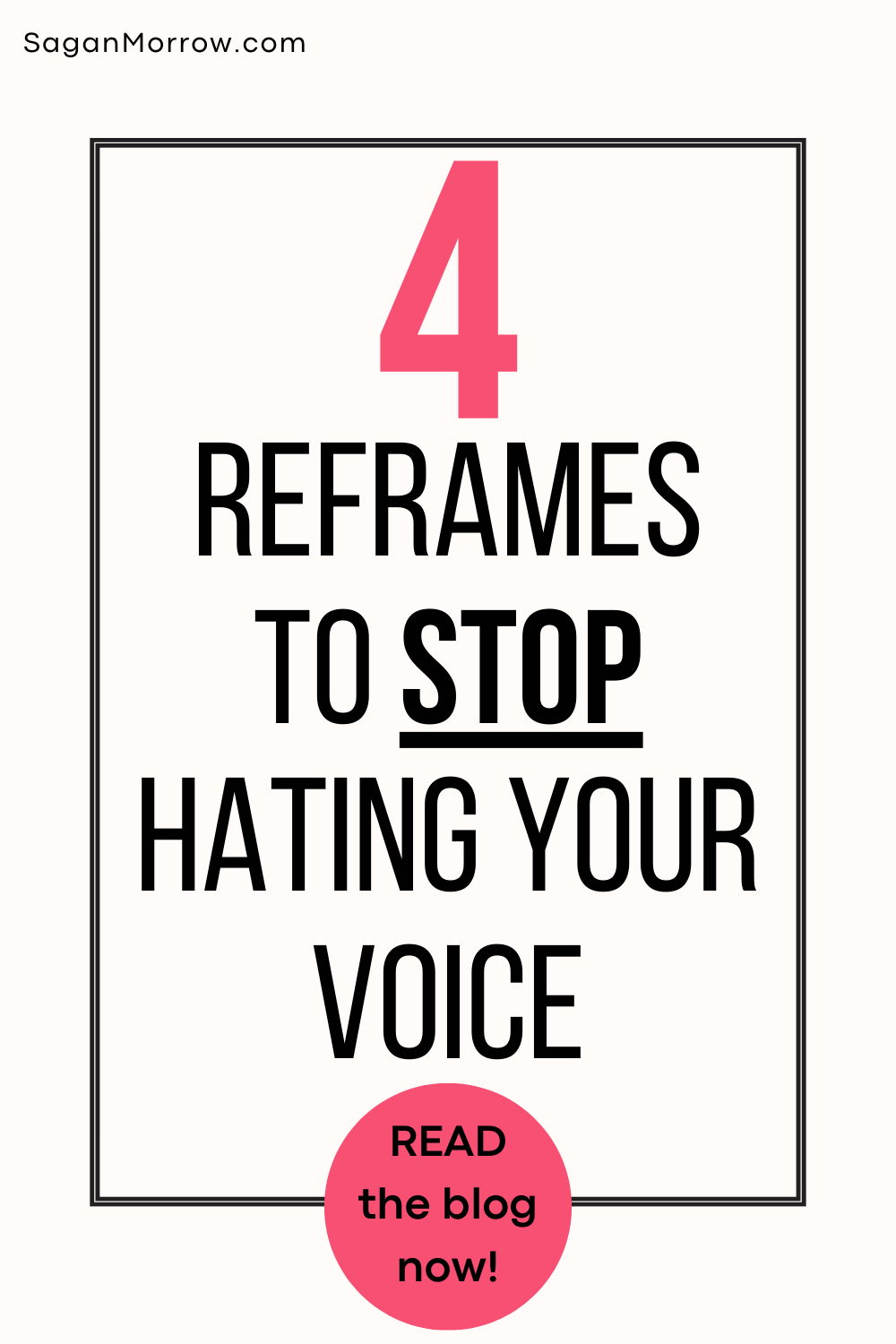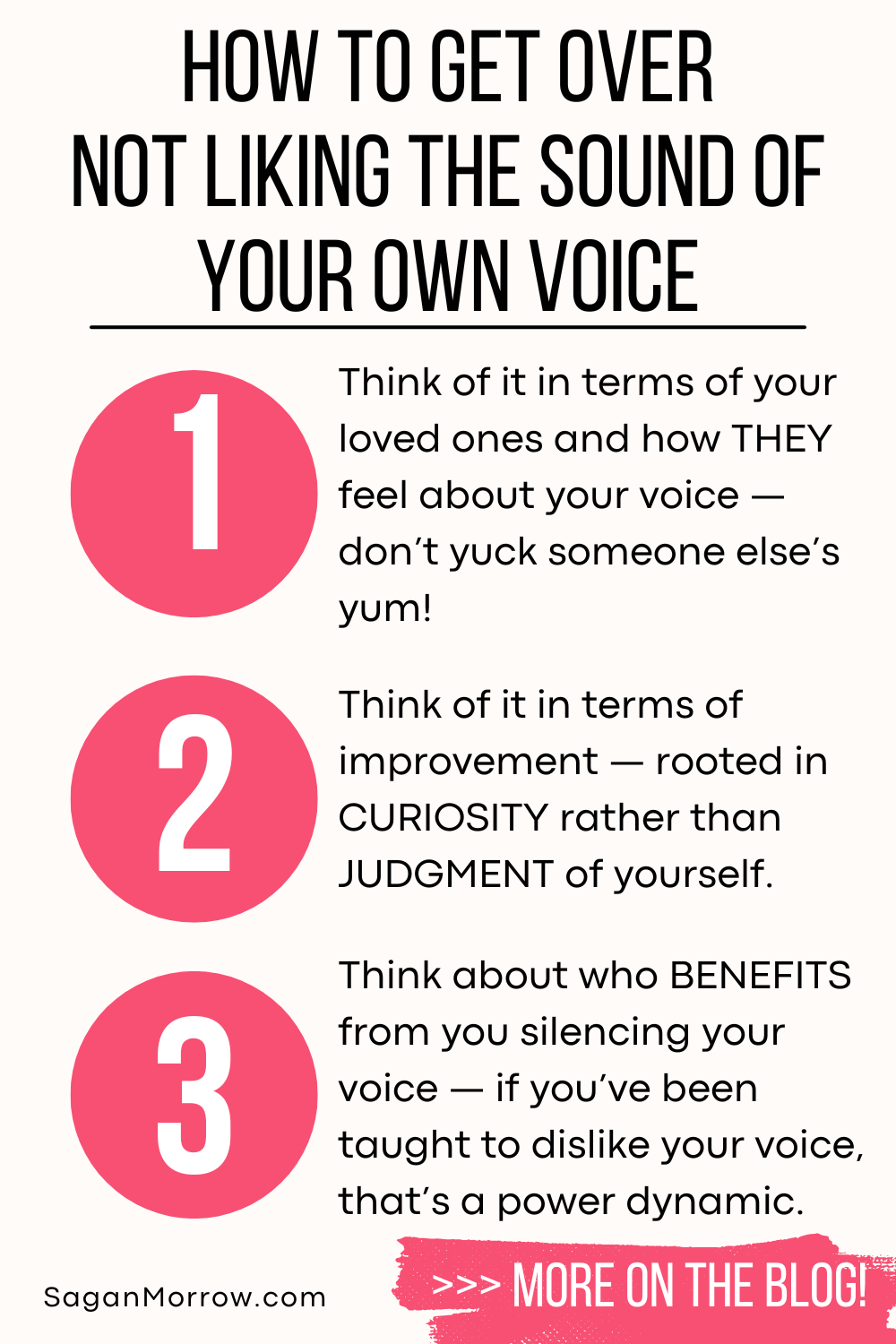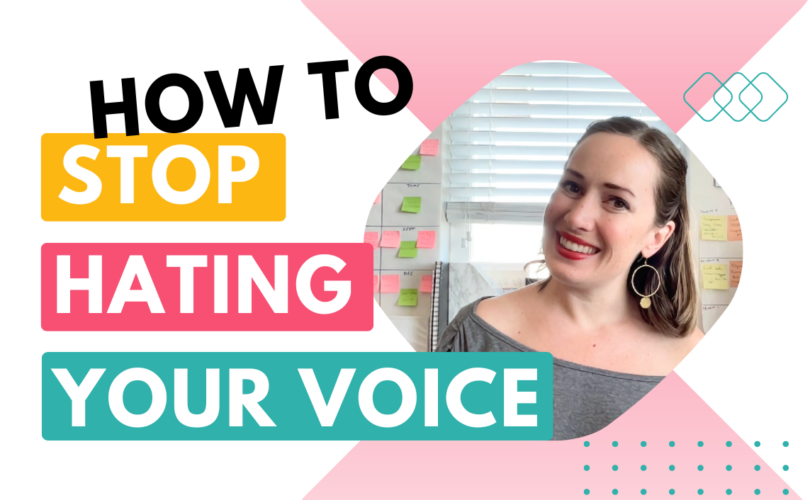“I hate the sound of my own voice.” “I don’t like looking at myself in the mirror.” Does that sound familiar? Let’s talk about disliking your own voice or how you look — plus how to get over not liking the sound of your voice and even how to STOP hating your voice or hating the way you look in the mirror! (Psst... This is important mindset work to do for self improvement and professional development.)
As a personal fulfillment coach, I’ve had clients say they don’t like seeing themselves on camera or they don’t like hearing the sound of their own voice. And it’s not just clients! This comes up in all different areas of life:
- Podcast guest listening to a podcast episode they recorded: “Ugh, I hate hearing myself speak.”
- Student offered a spot at the front of the room in fitness class: “I don’t like looking at myself in the mirror. I’m staying at the back, where I can’t see myself in the mirror.”
- Client in a coaching session: “How do I hide the portion of my video so I can’t see myself, but I can still see you?”
- Dancer watching a choreography video of themselves in a group dance: “It’s so uncomfortable to watch myself; I just want to dance without needing to look at the video afterward.”
These are all things I’ve heard multiple people say in different ways and in different scenarios.
It’s incredibly common: There are many, many people who refuse to listen to their own voice, they don’t like watching videos of themselves, etc.
Why do I hate the sound of my own voice? Why is it that I don’t like looking at myself in the mirror?
There could be MANY reasons why this is happening for you.
Is there often a self esteem issue going on? Well, yes — that can be a part of it.
But I find it goes deeper than that…
One of the biggest reasons I see it cropping up is because there is a discomfort in being confronted with ourselves — especially if we don’t look or sound or act in the same image as we have in our heads.
There are often parts of ourselves that we are dissatisfied with. For example: You might have regrets about past choices, or you might feel like you “should be” farther ahead than you are right now, or you might be doing certain things because other people want you to do them rather than because YOU want to do them, and so on.
It can be jarring to be confronted with yourself when you are not satisfied with who you are and what you are doing and who you are becoming.
(This is something to take very seriously especially if you're in the process of doing self improvement and personal growth work.)
FYI: One of the ways that you can deal with this is to ensure that you are genuinely personally fulfilled with your life and the active choices you make every single day! More on personal fulfillment in THIS blog post.
What else could be going on here, when you don’t like the sound of your voice or how you look in a mirror/on camera?
You might have discomfort in seeing yourself through the eyes of the rest of the world (and therefore you are more other-focused, based on external “validation”).
You also might have discomfort in seeing yourself differently than you expected (and therefore you are more self-focused, based on internal “validation”).
It’s likely a combination of both, but it often leans more heavily one way or the other for people.
OR — it could also be a discomfort arising in the realization that some aspect you dislike about (or judge in) others, you suddenly hear/see in yourself. That’s an unpleasant shock to the system!

What can you do about it, when you don’t like how you sound or how you look?
You can try to avoid it because it's uncomfortable… or you can make use of your voice/appearance, grow accustomed to it, and then over time stop being negatively affected by it. Doing that personal growth work can make a world of difference to your self improvement!
Once you understand the root issues at hand, it’s then about what you do with it that counts.
Addressing the root issues for these things is something you and I can do together in 1:1 personal fulfillment coaching sessions:
Is it REALLY possible to stop hating how you sound or how you look?
Yes!
For example, I used to hate the sound of my own voice — and then I found myself co-hosting a talk radio show.
I really did NOT want to listen to myself speak… but I also desperately wanted to improve as a speaker and as a radio personality.
So I listened to myself diligently, every single week. A full hour of hearing myself speak. In the beginning, it was painful! But I got curious about it and started to make improvements and adjustments here and there to my presence on the radio.
It’s gotten to the point now where I LIKE hearing myself and seeing myself.
I want that for you, too!
Here’s what I like about hearing my voice and seeing myself on camera or in a mirror…
Hearing and seeing myself helps me to be better.
For instance, I dance on stage as a hobbyist burlesque dancer — so being able to see videos of my performances helps me to figure out where I need to improve my movements, gestures, dancing, facial expressions, etc.
In another example, I do a lot of speaking engagements (e.g. podcasting, teaching workshops and classes, hosting conference sessions, etc) — so the more that I listen to myself, the more I can understand where I need to improve.
When I’m improving, it also means that my performances are more entertaining and enjoyable for audiences, and my presentations are more useful and interesting for the people I’m teaching. Plus, it improves my confidence on stage and it provides me with a deeper sense of satisfaction, fulfillment, and pride in knowing that I’m always doing a better job every time I do a performance or presentation.
I can critique myself without judgment.
I can learn from it and improve upon it.
I can get a more accurate sense of the idea I have in my head vs the reality of how I’m perceived, and the difference and/or similarities between the two.
That is helpful information! That is useful, powerful knowledge to have.
How to get over not liking the sound of your voice (and even how to stop hating your voice!), plus what to do when you don’t like looking at yourself in the mirror
The best methods for how to get over not liking the sound of your voice, or what to do when you don’t like looking at yourself in the mirror, are going to depend on your unique situation and the reasons WHY you hate your voice or hate looking in the mirror.
However, there are several reframes and mindset shifts you can try to overcome these issues…

Reframe #1 for how to get over not liking the sound of your voice: Think of it in terms of the other person.
“Don’t yuck someone else’s yum” is the concept that if someone likes a thing, don’t bash on that thing just because you aren’t a fan.
For example, let’s say your friend is obsessed with chocolate, but you think chocolate’s gross. You’re hanging out with them and they happen to have a big bar of chocolate. They start eating that chocolate and they’re having the time of their life, not hurting anyone, simply enjoying themselves… and then you come along and say, “Ew. I can’t believe you’re eating that! Chocolate is disgusting.”
How does that make them feel?
They were happily enjoying their thing, minding their own business… and now they’ve been told they shouldn’t like it.
→ It’s the same with how they view YOU.
When you are dismissive of your voice or your appearance, but your friend enjoys being in your presence, you are being dismissive of their taste in friends.
There are so many people who love you — don’t you think it’s unfair to them that you are putting yourself down?
The people who love you don’t think you have a weird voice. They have conversations with you all the time! They love hearing you speak! They love hearing what you have to say!
…And when you come along and say, “Ugh, I hate the sound of my voice,” you’re also implying that they are wrong for enjoying your voice.
Reframe #2 for how to get over not liking the sound of your voice: Think of it in terms of improvement, rooted in curiosity.
For example: “Listening to myself speak helps me realize that I overuse X word — now that I know it’s happening, I can do something about it… so that a year from now, I’ll actually ENJOY hearing myself speak!”
In this case, you’re disconnecting the emotional charge from the equation, and instead looking at it through a more detached lens. It’s also far more empowering because you can begin to understand yourself better and make improvements.
The other aspect of this — and where it can get uncomfortable — is to start to explore, “WHY don’t I like hearing my voice? What about seeing myself on video is so jarring?”
That can be an uncomfortable (albeit extremely valuable and informative) line of questioning, because it puts you in the very position you are currently avoiding: Confronting some part of yourself that you do not wish to give your attention to or explore.
The curiosity aspect of this is crucial: You are approaching improvement through the lens of curiosity, as opposed to judgment. Judging yourself is VERY different than getting curious!
Curiosity vs Judgment: Here’s an example of how they are different…
- “Hearing myself say ‘um’ 10 times in 30 seconds is soooo cringey!” → Judgmental.
- “Wow, I said ‘um’ A LOT. What was it about that section of the podcast conversation that made me rely so much on filler words? Also, I’m going to challenge myself to start pausing every time I want to say ‘um’ in regular conversation so I can reduce the frequency. It might be tricky at first, but I’m going to give it a try!” → Curiosity.
You can see here that curiosity helps you to investigate underlying things at play (regarding how you present yourself) AND it’s much more solution-oriented, whereas being judgmental about yourself is basically just trash talking! Being judgmental is not helpful for you — it’s disempowering.
Being judgmental toward yourself weakens you.
Being curious toward yourself STRENGTHENS you.
Are you enjoying these mindset shifts? Get 12+ thought exercises to help you reconnect with yourself and tap into your intuition in my free, on-demand MASTERCLASS:
Reframe #3 for how to get over not liking the sound of your voice: Think about who benefits from you silencing your voice or hiding yourself.
This is a really important question: Who benefits from you being silent, or not showing up visibly?
For example, there are some VERY interesting dynamics in patriarchal thinking, regarding our society being dismissive of the “valley girl” voice and women doing uptalk. This is a way to silence women; to tell women that their voices are not as important as men’s.
When you are taught to dislike your own voice, you won’t USE your voice as much.
When you aren’t using your voice as much, you are in effect learning how to silence yourself. You are not speaking up.
Similarly, women in our society are taught to literally take up less space: Conventional beauty standards want women to be skinnier, to take up less space. To be literally less visible.
This, too, is a power dynamic.
When you are vocal and/or visible, you are taking up space. You are asserting yourself. You are saying, “I matter.”
Reframe #4 for how to get over not liking the sound of your voice: Focus on one thing that you DO like.
For example, your voice: Maybe you don’t like the SOUND of your voice, but you like the WORDS you used. Or maybe you don’t like the pitch of your voice, but you appreciate that you speak in full sentences rather than run-on sentences.
For example, your appearance: Maybe you don’t like that you aren’t a “perfect fit” for current social beauty norms, but you love that your nails are strong and healthy. Or maybe you don’t like the shape of your chin, but you really like your eye colour.
Rather than focusing so much on your supposed “flaws” (which, going back to Reframe #1, aren’t REALLY necessarily flaws at all — they’re simply perceived flaws), this is an opportunity to focus your energies more on what you appreciate or like about yourself.
Even if that’s only ONE thing.
Start with that one thing. And then start to challenge yourself: What ELSE do you like? Or, what do you at the very least like more than the thing that you feel so strongly against?
This can help you to start to appreciate more and more things about yourself, which can be useful for a) increasing your self esteem, and b) being able to continue showing up (vocally or visibly).
Want to continue working on your personal growth and self improvement?
You deserve to build a better relationship with yourself — and you don’t need to do it on your own!
Book your personal fulfillment coaching sessions today and I’ll help you every step along the way:

